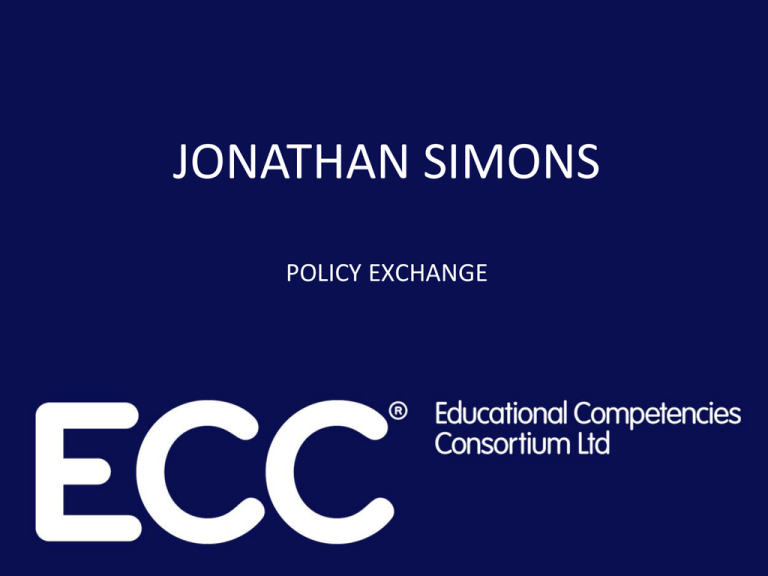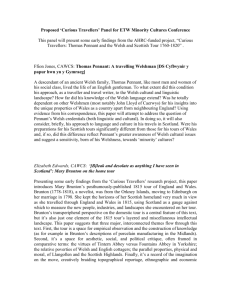Jonathan`s
advertisement

JONATHAN SIMONS POLICY EXCHANGE HE reform 2010-2015– problems solved or problems delayed? Jonathan Simons Head of Education, Policy Exchange @PXEducation Policy Exchange is an independent, non-partisan educational charity seeking free market and localist solutions to public policy questions. Charity Registration Number 1096300. Browne and associated reforms in English HE system • Fees capped at £9k; any fee over £6k should be partially invested in fair access • Repayments start at £21k with write off after 30 years • Return of means tested grants • New duty on schools to provide independent, impartial careers guidance. All universities to provide Key Information Sets • Core and margin with reallocation of place to high quality institutions charging below £7,500 • No student number controls on AAB students (since changed to ABB, and student number controls to be abolished entirely from 2015-16) Scottish HE system • 4 year courses rather than 3 (some RUK students can enter in Y2) • Differential tuition fees for students from Scotland and EU as opposed to England, Wales, N Ireland (RUK) – who are charged up to the same £9k as in England • “Rocks will melt in the sun” before Scottish students charged tuition fees under SNP Government Welsh HE system • Welsh Government have protected the cuts to teaching grant to 12% to universities in Wales (against 80% in England) but also raised tuition fee cap to £9k • Welsh students studying in Wales or England were eligible for subsidy to deal with higher fees – tuition fees capped at £3,575 wherever they study, which costs the Welsh Government around £4,500 per student annually. Figures show a move of Welsh students to English universities • Sir Ian Diamond undertaking consultation into higher education funding in Wales, but not due to report back until 2016 Problems solved? HE funding (England) Student numbers across UK Student numbers across UK Student satisfaction Problems delayed? Already calls for more funding increases ...at the same time as some political desire to cut them again What about non first time full time undergraduates? Is the current system in the UK sustainable? England Total value of outstanding loans (including interest) is currently £46 billion. It is projected to top out at £200bn by 2042 in 2013 prices) Is the current system in the UK sustainable? England NAO found that of the current loan book, BIS estimate 35% will never be repaid, and up to 50% of post 2012 loans will not. However, worth remembering that this is the point (and consequence) of a deliberate policy decision Is the current system in the UK sustainable? Scotland • So much hangs on what might happen post independence referendum • If yes: • Most pertinently, the future of the differential tuition fee policy – would it be legal? • What about research council income • Future student flows and staff flows • Potential £9.8bn shortfall in USS pension scheme (analogy of Academy status in schools in pertinent here) • If no: • Is the differential tuition fee policy affordable – and is it value for money? Look at student increases in different nations of the UK Is the current system in the UK sustainable? Wales • Will Diamond review mean the end of the tuition fee subsidy for Welsh students? £35m annually going outside of Wales (mostly to England) • Will we see more M+A activity amongst institutions to strengthen overall quality (Cardiff ranked 29th in UK, highest in Wales, and only three Welsh institutions in top 100) Conclusions • Lots of change, particularly in England and Wales, since 2010 • On surface, system looks positive in England and Scotland • But overall lots of issues remain to be resolved • Is the English system affordable to the Exchequer, and specifically to BIS. Will a graduate tax come in and if so how on earth will it be managed. Will fees rise along with new students? • Will the Scottish system survive in its current form post any yes vote in independence? And if a no vote, will a non SNP government look at introducing fees for Scottish students? • How can Wales ensure better value for money? And should they focus on Welsh students, or the Welsh system? Conclusions • There will be a ‘conspiracy of silence’ amongst parties in UK General Election in 2015 • In Independence referendum in 2014 and Welsh Assembly elections in 2016 it will be debated more intently but in absence of many proven facts.... • We may well have to have – reluctantly – another major review in all three nations, especially England, midway through next Parliament JONATHAN SIMONS POLICY EXCHANGE











